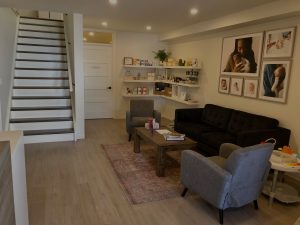Occupational Therapists (OTs) assess an infant or child’s development with a focus on their “occupations”.
For infants and children, this may include:
- Play
- Eating
- Sleeping
- Building Independence in Self-care Activities
- Successfully participating in programs such as childcare or school
The WOMB’s OTs will work with you and your child toward meeting your child’s developmental goals and milestones. As play is one of the main occupations for any child, your OT will use a fun, play-based approach to assess and interact with your child. The OT will also coach you or another caregiver to feel confident in your ability to support your child in their own environment.
Areas of focus may include:
- Fine motor: including using both hands together, reaching and grasping toys, coordination of small finger movements required for self-help activities, handwriting, holding a pencil and using scissors.
- Self-help: including self-feeding, getting dressed, bathing and brushing teeth.
- Feeding: including managing textures, transitioning to solids, independently feeding, using utensils, picky eating, positioning, chewing and swallowing.
- Sensory processing: over or under sensitive to input involving sight, hearing, touch, taste, smell and movement
- Visual-motor: Coordinating the body’s movements based on what the eyes perceive.
- Play: including how to play, developmental stages of play, toy selection and motor skills for play.
- Cognition: Thinking and planning for what is needed for daily functioning (Example: learning, organization, problem solving, focus and attention)
- Self-regulation: How we manage our thoughts, emotions, and behaviours.
- Social skills: How we interact with others.





